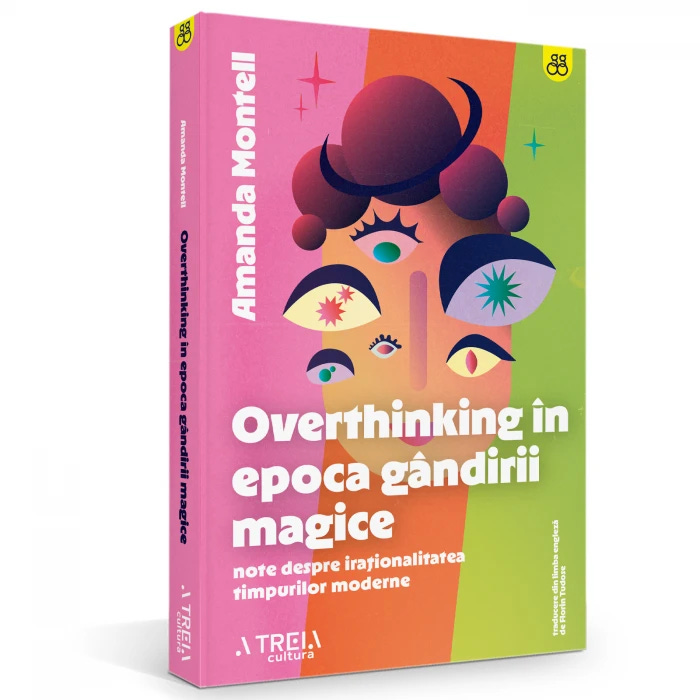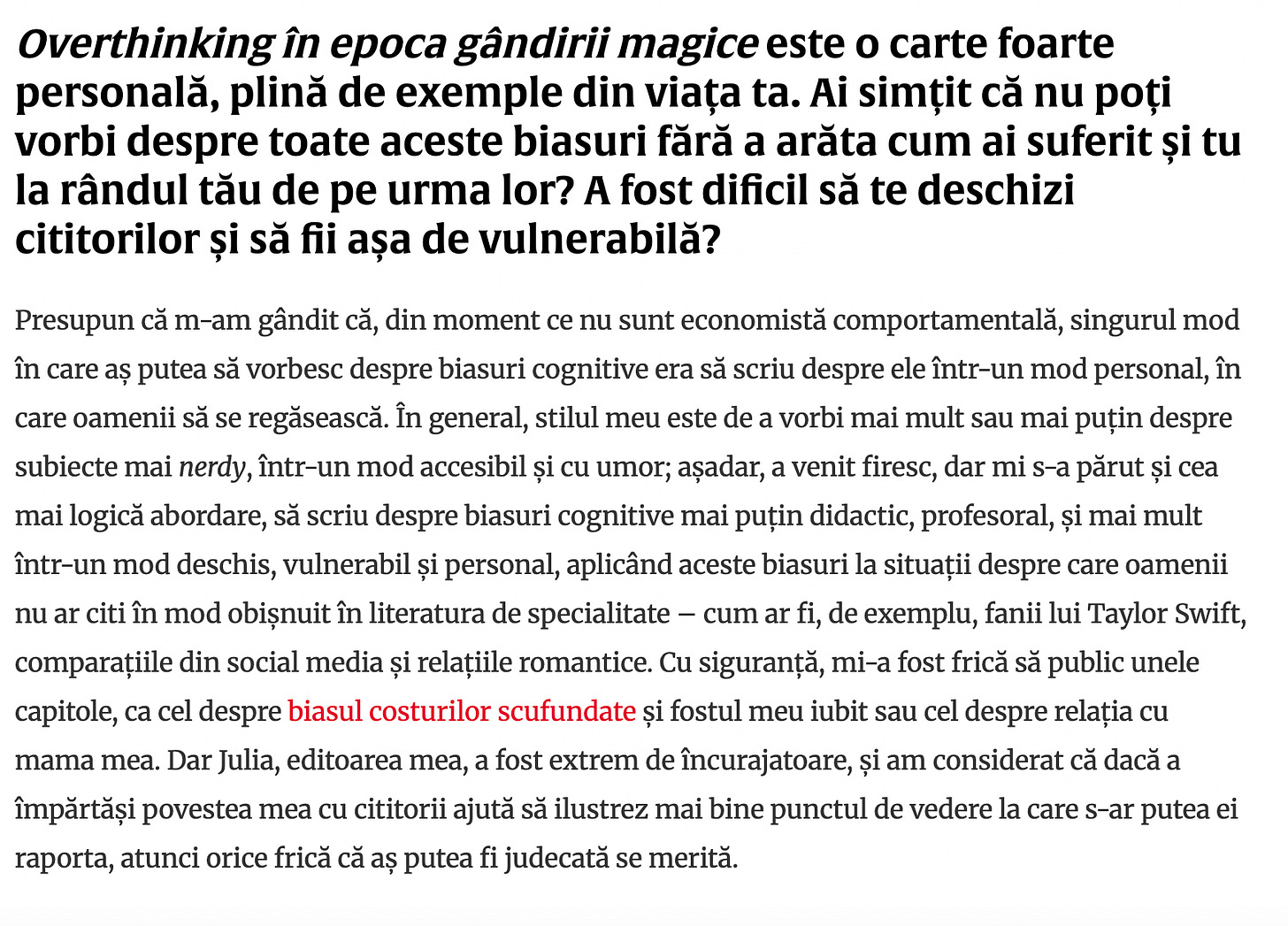Addressing GoodReads haters (& Donald Trump)
A juicy interview for the Romanian publication of The Age of Magical Overthinking :)
Last year, I signed a contract for the Romanian translation of The Age of Magical Overthinking: Notes on Modern Irrationality. I sort of forgot about the deal until the publisher sent through their version of the cover last month. I was instantly AWESTRUCK. As if by magic, my Romanian design team somehow intuited and captured something very close to my original vision for the cover, long before the fingers crossed concept that appears on the U.S. cover entered the picture. I love this vivid, aliengelic overthinker girl so much. I am she, and she is me!
For the Romanian publication, reporter Victor Cobuz interviewed me for the publication Scena9, and I thought I’d share the English version below because some of these questions were so unique (and a little spicy), addressing the book’s blend of genres, GoodReads “haters,” the cognitive biases present in Donald Trump, and more! Thus, the semi-clickbait title of this newsletter post :)
Scena9: In the "Acknowledgments" section, you stated that this is the book you’ve always dreamt of writing. Why is the subject of modern irrationality so special to you and why have you decided to devote your attention to it only after writing books about gendered and "cultish" language?
Amanda: I am incredibly lucky at this point in my career to get to follow my curiosities where they take me. This book was a dream to write because it allowed me to tackle big questions about the clash between the human mind and the Information Age through the lenses of pop culture, literature, and social science. I truly relish the ability to write in a cross-genre style. But more specifically, the subject of irrationality felt significant to me having grown up in a household of scientists. I was the emotional, “dramatic” one in the family, you might say. I was raised to value science deeply, but I was equally drawn to “magic.” The push-pull between logos and pathos has in a way defined my entire life, and it was very meaningful to get to write about it.
The Age of Magical Overthinking is a deeply personal book, filled with examples from your personal life. Have you felt that you cannot talk about these biases without showing how you have suffered from them? Was it difficult to open up and be this vulnerable?
I suppose I figured the only way I could pull off talking about cognitive biases was to write about them in a personal, relatable way. Generally, my style as a writer is more or less to talk about nerdy subject matter in a fun and accessible style; so, it came naturally, but also just seemed like the most sensible approach, to write about cognitive biases less in a didactic or professorial fashion and more in an open, vulnerable, personable way, applying these biases to situations one wouldn’t ordinarily read about in academic literature, like Taylor Swift fans, social media comparison, and romantic relationships. Certain chapters certainly scared me to publish, like the one about the sunk cost fallacy and my ex-boyfriend, and another about my relationship with my mom. But my editor Julia was extremely encouraging, and I reasoned that if sharing my story would help illustrate a point that others could relate to, it was worth any fear of judgment.
What were the selection criteria for the cognitive biases included in the book? Were there any other biases that you would have wanted to write about?
In terms of choosing which biases to focus on for each chapter, it was really an intuitive process. If one immediately set off a mental lightbulb, reminding me of an irrational behavior from my own life or that I’d seen in society at large, that was a good indication I should include it as a chapter theme. And then of course, some related biases are explored in smaller ways; for example, I talk about negativity bias in the declinism chapter and frequency bias in the proportionality bias chapter. I did end up adding and then cutting a last-minute chapter that talks about my objectively irrational love of witchcraft. I’m planning to share that in audio form on my Magical Overthinkers podcast later this year for Halloween.
(You can also read that chapter in three parts here on the newsletter.)
It’s pretty clear how these biases are causing us problems in our daily lives, but can we also see them as the roots of our current social and political crises?
Without question. In my chapter on overconfidence bias, I hope people clearly see how the research shared applies to the behavior of Donald Trump and Elon Musk.
We can identify some cognitive biases both in Donald Trump's decisions and in the support of his voters. I think that's why a lot of people – especially here in Europe – are nervously waiting for some kind of collective awakening from which the millions of American citizens who support Donald Trump will turn on him. Do you think this is something feasible or is it just an illusion? What do you think about the first month of the Trump administration and what do you think might come next?
I perceive endless cognitive biases in Donald Trump and wake up every day thinking about what I might be able to do with the comparatively tiny amount of influence I have to shed light on the harms he and his circle are causing and will continue to cause. I was just texting with my mom, a cancer cell biologist, about how catastrophic it would be to society if Trump and Elon Musk defund the National Institutes of Health in the U.S., which funds all of basic science, including cancer research and more. This is just the latest Trump-related anxiety of many. I have to say, the chance of a miraculous cultural awakening is slim, and declinism predicts that people are not prone to making good choices for their future selves—regarding the climate, for instance. I try not to predict the future; it’s not a good habit for overthinkers. Instead, I find that doing things for my physical community, supporting the causes I care about with my dollars, and fearlessly talking about the subjects that matter to me in my books and on my podcasts is the best I can do.
If these cognitive biases are affecting us on a collective level, how can we fight them? Ultimately, is it a collective process or an individual one?
Individual awareness is a start, as is opening up curiosity-driven conversations with people in our lives, but I don’t think people respond very well to having the fallacies of their minds explained to them unless they’re already open and curious to explore that. Even so, there are certain biases, like the illusory truth effect—our tendency to think something is true just because we’ve heard it multiple times—that are so powerful, even awareness doesn’t help. (I wrote more about that in an essay for The Guardian.) I find that if anything, slowing down our thought processes by periodically disconnecting from technology and reengaging with real-life community and nature, is one of the most curative things we can do to soften this collision between our ingrained cognitive biases and the modern world.
Each bias has a clear psychological reason to exist and you try to pinpoint how every one of them is at the beginning helpful in one way or another. Which one do you think is the most beneficial one for us?
The most destructive and ever-present one is ironically probably also the most useful: confirmation bias, or our tendency only to seek out, believe, and remember information that validates what we already think, while rejecting opposing information. It proves extra harmful in this hyper-digital, super-polarized era full of lightning fast data exchange and misinformation, but also, to quote German philosopher Uwe Peters, confirmation bias “helps us bring social reality into alignment with our beliefs.” It helps the world “make sense;” it helps us live with ourselves and our choices. And devoid of that, I don’t know if I’d be able to get through a single day.
Some reader reviews have stated that your essays should have entered more deeply into the complex matters which are central to the book, but at the same time it’s very clear that you did not intend to write a psychological treatise. Is the attempt to maintain a balance between the scientific parts of the essays and the one referring to popular culture the biggest challenge in writing this book? If not, which one was it?
Speaking of an overwhelm of information in the digital age, I avoid looking at reviews from readers. Being exposed to so many conflicting thoughts sends me into a spiral of overthinking that is harmful to both my spirit and my work. All I can say is that I was intentional about the blend of social science and pop culture I included in my book. I’m not an academic; rather, I write cultural commentary that incorporates social sciences but is also accessible to read. So I’d say for a book of essays on pop culture and my own life, it actually goes quite deep! It’s all about readers’ expectations, I think. As one of my wonderful blurbers, novelist Mona Awad, put it, The Age of Magical Overthinking is “a voyage into the furnace room of the modern mind.” It’s an exploration, a reckoning, a conversation starter. The biggest challenge of this book was honestly just narrowing down exactly what I wanted to say with it, because so many subjects interest me. The blend of genres isn’t for everyone, but it is authentic to me.
I have read on Goodreads a lot of comments of how people enjoyed listening to the audiobook version which you have narrated. How was this experience to you and do you think the readers gain something extra from hearing you reading your texts?
Definitely. The book was written in my authentic voice, I loved narrating it, and I actually think it comes alive even more in audio form.
After writing your dream book, are there any other subjects that spark your curiosity and that you would want to explore?
I am now writing a novel! It’s speculative fiction, and it is the most fun I’ve ever had writing a project in my life.

















